10 jan 2018

The Israeli authorities on Tuesday demolished a Palestinian residential facility in Ramla city in the central 1948 occupied Palestine for allegedly being unlicensed.
Local sources reported that Israeli bulldozers knocked down a house owned by the Palestinian citizen Ayman Abu Rayyash and his seven-member family in al-Ribat neighborhood and uprooted a number of olive trees near the house.
Ayman Abu Rayyash said that Israeli municipality bulldozers, escorted by a large police force, stormed the neighborhood without prior warning and imposed a cordon around the area before the demolition.
Rayyash told Quds Press, "They demolished the house without allowing us to get the furniture out," adding that that they were left in the open without shelter.
The Ramla popular committee called for an urgent meeting to discuss ways of confronting the Israeli municipality's racist policies and start the reconstruction of the demolished house.
The Israeli authorities have recently stepped up their demolition operations in the 1948 occupied Palestinian territories in a thinly veiled attempt to settle the Palestinians living there in small, isolated communities.
Nearly 1,800,000 Palestinians currently live in the 1948 occupied Palestine and they are the descendants of 160,000 Palestinians who managed to stay in their lands following the establishment of Israel in 1948.
Palestinians represent 20% of the population of the Hebrew state and they are subjected to constant discrimination especially in the fields of housing and employment.
Local sources reported that Israeli bulldozers knocked down a house owned by the Palestinian citizen Ayman Abu Rayyash and his seven-member family in al-Ribat neighborhood and uprooted a number of olive trees near the house.
Ayman Abu Rayyash said that Israeli municipality bulldozers, escorted by a large police force, stormed the neighborhood without prior warning and imposed a cordon around the area before the demolition.
Rayyash told Quds Press, "They demolished the house without allowing us to get the furniture out," adding that that they were left in the open without shelter.
The Ramla popular committee called for an urgent meeting to discuss ways of confronting the Israeli municipality's racist policies and start the reconstruction of the demolished house.
The Israeli authorities have recently stepped up their demolition operations in the 1948 occupied Palestinian territories in a thinly veiled attempt to settle the Palestinians living there in small, isolated communities.
Nearly 1,800,000 Palestinians currently live in the 1948 occupied Palestine and they are the descendants of 160,000 Palestinians who managed to stay in their lands following the establishment of Israel in 1948.
Palestinians represent 20% of the population of the Hebrew state and they are subjected to constant discrimination especially in the fields of housing and employment.
9 jan 2018
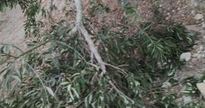
Israeli Occupation Forces (IOF) on Tuesday detained the crew of Palestine TV during covering the attacks of Jewish settlers on the inhabitants of Deir al-Hatab town east of Nablus.
Eyewitnesses revealed that a group of Israeli settlers of Elon Moreh settlement assaulted the journalists who were filming uprooting olive trees by settlers before the intervention of IOF soldiers and detaining the crew.
Eyewitnesses revealed that a group of Israeli settlers of Elon Moreh settlement assaulted the journalists who were filming uprooting olive trees by settlers before the intervention of IOF soldiers and detaining the crew.

The Israeli navy forces on Tuesday morning arrested six Palestinian fishermen and confiscated two boats off Gaza shores.
Local sources reported that the Israeli navy opened fire at Palestinian fishing boats off al-Sudaniyya shore in northern Gaza, arrested six Palestinians, including two children, and forced them to strip off their clothes and get into the sea.
The Israeli forces also seized two boats and transferred them, along with the six detainees, to Ashdod port.
Head of the fishermen committee at the Union of Agricultural Work Committees, Zakaria Baker, told the PIC that the Israeli navy forces deliberately harass Gazan fishermen on a daily basis by shooting at them, arresting them, confiscating their boats or damaging their fishing nets.
Local sources reported that the Israeli navy opened fire at Palestinian fishing boats off al-Sudaniyya shore in northern Gaza, arrested six Palestinians, including two children, and forced them to strip off their clothes and get into the sea.
The Israeli forces also seized two boats and transferred them, along with the six detainees, to Ashdod port.
Head of the fishermen committee at the Union of Agricultural Work Committees, Zakaria Baker, told the PIC that the Israeli navy forces deliberately harass Gazan fishermen on a daily basis by shooting at them, arresting them, confiscating their boats or damaging their fishing nets.

The Israeli occupation forces (IOF) last night and at dawn Tuesday kidnapped 17 Palestinian citizens and confiscated several cars during campaigns in different West Bank areas.
Local sources told the Palestinian Information Center (PIC) that Israeli troops stormed at dawn al-Arroub and al-Fawwar refugee camps in al-Khalil city and kidnapped five Palestinian young men, including two brothers.
The two brothers were identified as Yousef and Nasim Attiti. The former recently received medical assistance after he suffered a bullet injury during skirmishes with Israeli soldiers in al-Arroub refugee camp.
Two others identified as Ayman Qassas and Ali Asi were also taken prisoners during the same IOF campaign in al-Arroub camp.
In al-Fawwar camp, local sources said that Israeli soldiers rounded up a young man at the main entrance to the camp at the pretext that he threw a Molotov cocktail at settlers’ cars.
Meanwhile, the IOF stormed different towns in al-Khalil and confiscated cars belonging to Palestinian citizens, without providing a reason for such measure.
In Nablus, the IOF kidnapped two young men from the towns of Qusra and Urif.
Local sources said that soldiers raided several stores in Qusra town, kidnapped a young farmer called Qusay Abu Raida and confiscated his tractor.
In Urif town, an Israeli military force broke into the house of Mohamed Shahada and kidnapped his son Anas.
In Salfit, the IOF confiscated security camera recordings from a gas station in the city and kidnapped two young men from their homes in Deir Istiya town to the north.
The IOF also stormed Tulkarem city and kidnapped a Palestinian citizen called Luay Shadid.
Seven Palestinian young men were also taken prisoners during IOF raids on homes in other areas of the West Bank, including Ya’bad town in Jenin.
Local sources told the Palestinian Information Center (PIC) that Israeli troops stormed at dawn al-Arroub and al-Fawwar refugee camps in al-Khalil city and kidnapped five Palestinian young men, including two brothers.
The two brothers were identified as Yousef and Nasim Attiti. The former recently received medical assistance after he suffered a bullet injury during skirmishes with Israeli soldiers in al-Arroub refugee camp.
Two others identified as Ayman Qassas and Ali Asi were also taken prisoners during the same IOF campaign in al-Arroub camp.
In al-Fawwar camp, local sources said that Israeli soldiers rounded up a young man at the main entrance to the camp at the pretext that he threw a Molotov cocktail at settlers’ cars.
Meanwhile, the IOF stormed different towns in al-Khalil and confiscated cars belonging to Palestinian citizens, without providing a reason for such measure.
In Nablus, the IOF kidnapped two young men from the towns of Qusra and Urif.
Local sources said that soldiers raided several stores in Qusra town, kidnapped a young farmer called Qusay Abu Raida and confiscated his tractor.
In Urif town, an Israeli military force broke into the house of Mohamed Shahada and kidnapped his son Anas.
In Salfit, the IOF confiscated security camera recordings from a gas station in the city and kidnapped two young men from their homes in Deir Istiya town to the north.
The IOF also stormed Tulkarem city and kidnapped a Palestinian citizen called Luay Shadid.
Seven Palestinian young men were also taken prisoners during IOF raids on homes in other areas of the West Bank, including Ya’bad town in Jenin.

On Monday, 08 January 2018, Israeli gunboats chased and opened fire at Palestinian fishing boats. Israeli naval forces then arrested 2 fishermen and confiscated a fishing boat manned by them.
The Palestinian Center for Human Rights (PCHR) monitored the escalation of Israeli attacks against fishermen in the Gaza Sea, in addition to the continuous shooting and shelling against them since 06:00 on Monday morning, despite sailing within the allowed fishing areas.
According to PCHR’s investigations, at approximately 12:00 on Monday, 08 January 2018, Israeli gunboats stationed off al-Waha Resort shore, northwest of Beit Lahia in the northern Gaza strip, opened fire at Palestinian fishing boats sailing within 3 nautical miles.
The Israeli gunboats then surrounded a fishing boat belonging to Mohamed Omar al-Najjar. The fishing boat was manned by Jehad Suhail Murad (25) and Mostafa Mohamed Murad (18), both of them are from al-Shati’ refugee camp in Gaza City.
The Israeli naval soldiers then forced them to take off their clothes, jumped into the water and swim towards the Israeli gunboat. The fishermen were then arrested while the boat was confiscated.
In light of the above, PCHR strongly condemns the Israeli ongoing attacks against Palestinian fishermen in the Gaza Strip and calls for:
The Palestinian Center for Human Rights (PCHR) monitored the escalation of Israeli attacks against fishermen in the Gaza Sea, in addition to the continuous shooting and shelling against them since 06:00 on Monday morning, despite sailing within the allowed fishing areas.
According to PCHR’s investigations, at approximately 12:00 on Monday, 08 January 2018, Israeli gunboats stationed off al-Waha Resort shore, northwest of Beit Lahia in the northern Gaza strip, opened fire at Palestinian fishing boats sailing within 3 nautical miles.
The Israeli gunboats then surrounded a fishing boat belonging to Mohamed Omar al-Najjar. The fishing boat was manned by Jehad Suhail Murad (25) and Mostafa Mohamed Murad (18), both of them are from al-Shati’ refugee camp in Gaza City.
The Israeli naval soldiers then forced them to take off their clothes, jumped into the water and swim towards the Israeli gunboat. The fishermen were then arrested while the boat was confiscated.
In light of the above, PCHR strongly condemns the Israeli ongoing attacks against Palestinian fishermen in the Gaza Strip and calls for:
- Immediately ending Israeli violations against fishermen and allowing them to sail and fish freely in the Gaza Sea;
- Releasing those fishermen arrested by Israeli forces; and
- Calls upon the international community, including the High Contracting Parties to the 1949 Fourth Geneva Convention, to intervene to stop all Israeli violations against fishermen and allow them to fish freely in the Gaza Sea.
8 jan 2018
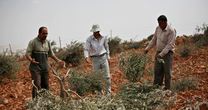
Israeli settlers on Monday evening uprooted dozens of olive trees on Palestinian lands in Deir al-Hatab, east of Nablus province.
According to Mohamed Omran, a native of Deir al-Hatab, Israeli settlers residing in Elon Moreh illegal outpost pulled up 50 trees in Palestinian olive groves.
The move was carried out just one hour after Israeli settlers were forced out of a makeshift house set up on Palestinian land in the area.
At least 423 Israeli settlement outposts engulf Palestinian towns and communities in the occupied West Bank and Jerusalem, making up 46% of Palestinian lands.
According to Mohamed Omran, a native of Deir al-Hatab, Israeli settlers residing in Elon Moreh illegal outpost pulled up 50 trees in Palestinian olive groves.
The move was carried out just one hour after Israeli settlers were forced out of a makeshift house set up on Palestinian land in the area.
At least 423 Israeli settlement outposts engulf Palestinian towns and communities in the occupied West Bank and Jerusalem, making up 46% of Palestinian lands.
7 jan 2018
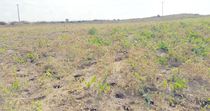
The Palestinian Ministry of Agriculture warned that herbicides were sprayed on Palestinian farmlands along Gaza’s eastern borders.
General Director of the soil and irrigation section of the Ministry Nizar al-Wahidi told the PIC reporter that a low-flying agricultural aircraft sprayed on Sunday morning herbicides on Palestinian farmlands.
Heavy damages were reported to agricultural lands following the Israeli move, he added.
Al-Wahidi called on the Palestinian Minister of Agriculture in Ramallah to act immediately to put an end to Israeli attacks.
General Director of the soil and irrigation section of the Ministry Nizar al-Wahidi told the PIC reporter that a low-flying agricultural aircraft sprayed on Sunday morning herbicides on Palestinian farmlands.
Heavy damages were reported to agricultural lands following the Israeli move, he added.
Al-Wahidi called on the Palestinian Minister of Agriculture in Ramallah to act immediately to put an end to Israeli attacks.
5 jan 2018

Israel has illegally notified construction companies in the Naqab (Negev) region that they must, themselves, verify that every project in which they are involved has been approved by authorities, and warned them that equipment and vehicles used in unauthorized construction will be confiscated.
Adalah – The Legal Center for Arab Minority Rights in Israel sent a letter to the Israeli National Planning and Construction Enforcement Unit demanding it cancel notices specifying that construction material suppliers and owners or drivers of construction vehicles are obligated to verify in advance that “construction projects” – defined to include even minor works such as digging a hole – for which they have been contracted to work have received authorization from the relevant Israeli authorities.
Article 218 of the Kaminitz Law, approved by the Knesset in April 2017, grants inspectors the authority to confiscate construction equipment if “the inspector has reasonable grounds to assume that unauthorized construction work is taking place before him.”
The amendment to Planning and Building Law – 1965, also known as the Kaminitz Law, is intended to increase the “enforcement and penalization of planning and building offenses.” However, it will have a disparate impact on Arab citizens of Israel because it fails to take into account the decades of Israeli confiscations of Arab lands and systematic discrimination in land planning and allocation that has resulted in a severe housing crisis in Arab communities throughout Israel.
Adalah Attorney Myssana Morany wrote, in her letter, that the National Planning and Construction Enforcement Unit had inaccurately interpreted Article 218. Indeed, the article specifies that it is not enough that an inspector has “reasonable grounds” to assume that a construction violation is taking place, but rather that the inspector must witness this violation taking place with his/her own eyes.
“The purpose of this authority [granted to inspectors] is strictly to prevent continued construction violations as they occur,” Adalah Attorney Myssana Morany wrote, in the letter.
The Israeli Attorney General has already declared that confiscating construction equipment is “a drastic law enforcement step and this authority must therefore be used very carefully… [and] upon consideration of the question of proportionality and the possibility of preventing the violation via other, less damaging, means.”
Adalah stresses that the notices issued to construction-related businesses in the Naqab region constitute a blatant abuse of authority and are legally baseless.
“Ultimately, all [these notices] do is intimidate people and mislead them into believing that building suppliers are legally obliged to verify that construction work is conducted with construction permits,” Attorney Morany wrote.
Adalah – The Legal Center for Arab Minority Rights in Israel sent a letter to the Israeli National Planning and Construction Enforcement Unit demanding it cancel notices specifying that construction material suppliers and owners or drivers of construction vehicles are obligated to verify in advance that “construction projects” – defined to include even minor works such as digging a hole – for which they have been contracted to work have received authorization from the relevant Israeli authorities.
Article 218 of the Kaminitz Law, approved by the Knesset in April 2017, grants inspectors the authority to confiscate construction equipment if “the inspector has reasonable grounds to assume that unauthorized construction work is taking place before him.”
The amendment to Planning and Building Law – 1965, also known as the Kaminitz Law, is intended to increase the “enforcement and penalization of planning and building offenses.” However, it will have a disparate impact on Arab citizens of Israel because it fails to take into account the decades of Israeli confiscations of Arab lands and systematic discrimination in land planning and allocation that has resulted in a severe housing crisis in Arab communities throughout Israel.
Adalah Attorney Myssana Morany wrote, in her letter, that the National Planning and Construction Enforcement Unit had inaccurately interpreted Article 218. Indeed, the article specifies that it is not enough that an inspector has “reasonable grounds” to assume that a construction violation is taking place, but rather that the inspector must witness this violation taking place with his/her own eyes.
“The purpose of this authority [granted to inspectors] is strictly to prevent continued construction violations as they occur,” Adalah Attorney Myssana Morany wrote, in the letter.
The Israeli Attorney General has already declared that confiscating construction equipment is “a drastic law enforcement step and this authority must therefore be used very carefully… [and] upon consideration of the question of proportionality and the possibility of preventing the violation via other, less damaging, means.”
Adalah stresses that the notices issued to construction-related businesses in the Naqab region constitute a blatant abuse of authority and are legally baseless.
“Ultimately, all [these notices] do is intimidate people and mislead them into believing that building suppliers are legally obliged to verify that construction work is conducted with construction permits,” Attorney Morany wrote.
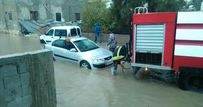
Heavy rainwater on Friday flooded Palestinian homes and agricultural greenhouses in Jenin governorate resulting in great damages including falling down of trees due to severe rainy and windy weather.
Local sources told the PIC reporter that a car was damaged as a big tree fell down on it in a school in Deir Abu Deif town in Jenin.
Rainwater flooded a number of greenhouses in Marj Ibn Amer and Sanour plains leading to various damages to some farmers, he added.
Local sources told the PIC reporter that a car was damaged as a big tree fell down on it in a school in Deir Abu Deif town in Jenin.
Rainwater flooded a number of greenhouses in Marj Ibn Amer and Sanour plains leading to various damages to some farmers, he added.
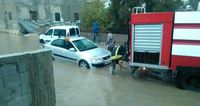
A number of Palestinian homes and agricultural lands were flooded due to continuous heavy rain over Thursday night and Friday morning in Tulkarem governorate, especially in al-Sharawiya area north of the city.
Palestinian farmers said that rainwater flooded large areas of their lands which are planted with vegetables. The covers of agricultural greenhouses were damaged due to windy weather.
Farmer Udai al-Tanib stated that his farm, which is located near the Israeli Separation Wall to the west of Tulkarem, was totally flooded with rainwater because of the blockage of water channels under the wall, causing him a great loss.
Municipality and Civil Defense crews rushed to the affected areas and offered help to the farmers. However, many of Palestinians homes in Tulkarem were flooded and the furniture of some houses were spoiled as a result.
Palestinian farmers said that rainwater flooded large areas of their lands which are planted with vegetables. The covers of agricultural greenhouses were damaged due to windy weather.
Farmer Udai al-Tanib stated that his farm, which is located near the Israeli Separation Wall to the west of Tulkarem, was totally flooded with rainwater because of the blockage of water channels under the wall, causing him a great loss.
Municipality and Civil Defense crews rushed to the affected areas and offered help to the farmers. However, many of Palestinians homes in Tulkarem were flooded and the furniture of some houses were spoiled as a result.

Palestinian farmers from Salfit and its villages have expressed fears that they may lose the remaining plots of their land, which are located near the illegal settlement of Ariel and isolated by Israel’s separation wall.
Such fears came up after the Israeli housing minister on Wednesday said he approved a plan to build new housing units in Ariel settlement, which was built on annexed Palestinian land in north Salfit and keeps expanding.
One of the farmers told the Palestinian Information Center (PIC) that he was afraid of losing what remained of his land behind the wall after Israel announced a plan to expand the settlement.
He pointed out that the settlement had previously encroached on part of his land and the new housing units would certainly devour the rest.
Such fears came up after the Israeli housing minister on Wednesday said he approved a plan to build new housing units in Ariel settlement, which was built on annexed Palestinian land in north Salfit and keeps expanding.
One of the farmers told the Palestinian Information Center (PIC) that he was afraid of losing what remained of his land behind the wall after Israel announced a plan to expand the settlement.
He pointed out that the settlement had previously encroached on part of his land and the new housing units would certainly devour the rest.
4 jan 2017
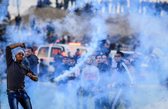
Israeli Occupation Forces (IOF) on Thursday destructed a number of Palestinian vegetables stalls at the entrance to al-Fuwar refugee camp in al-Khalil and expelled the stalls owners.
The PIC reporter said that IOF soldiers attacked Palestinians at Street 60 and ruined a number of stalls set up for selling vegetables and fruits, at the entrance to the refugee camp, which were spoiled as a result.
The PIC reporter said that IOF soldiers attacked Palestinians at Street 60 and ruined a number of stalls set up for selling vegetables and fruits, at the entrance to the refugee camp, which were spoiled as a result.
3 jan 2018
|
|
Businesses in the Gaza Strip have long been struggling under an Israeli blockade.
Many are barely able to keep their operations afloat - with some forced to close due to lack of supplies and other difficulties. Now, a new cartoon by an Israeli rights group tells the reality facing one business. |

A number of West Bank NGOs have denounced the simmering Israeli violations and attacks against street vendors in Jenin province.
Jenin’s NGOs and Commercial Chamber said in a Wednesday statement that Israeli bulldozers destroyed groceries and vegetable stores on Nazareth Street, near al-Jalama crossing point.
The statement added that such measures are flagrant violations of Palestinians’ human rights.
The destroyed caravans and stores reportedly belong to Palestinian vendors Fayez Shaaban, Majed Nassar, and Mourad al-Badawi.
For hundreds of Palestinians across the unemployment-stricken occupied territories, street selling represents the sole source of income to feed their families and children.
Jenin’s NGOs and Commercial Chamber said in a Wednesday statement that Israeli bulldozers destroyed groceries and vegetable stores on Nazareth Street, near al-Jalama crossing point.
The statement added that such measures are flagrant violations of Palestinians’ human rights.
The destroyed caravans and stores reportedly belong to Palestinian vendors Fayez Shaaban, Majed Nassar, and Mourad al-Badawi.
For hundreds of Palestinians across the unemployment-stricken occupied territories, street selling represents the sole source of income to feed their families and children.

The Israeli police continue to chase down Palestinian workers in territories occupied in 1948 (Israel).
Speaking with the Palestinian Information Center, workers from the occupied West Bank said they have been subjected to arbitrary abductions and crackdowns by Israeli cops.
The workers added that police troops have ransacked shops, commercial structures, and buildings under construction and arrested several workers. Dozens more have been made to endure exhaustive interrogations.
The Israeli occupation authorities also continue to slap steep fines on Palestinian workmen on claims that they entered territories occupied in 1948 without permits.
Speaking with the Palestinian Information Center, workers from the occupied West Bank said they have been subjected to arbitrary abductions and crackdowns by Israeli cops.
The workers added that police troops have ransacked shops, commercial structures, and buildings under construction and arrested several workers. Dozens more have been made to endure exhaustive interrogations.
The Israeli occupation authorities also continue to slap steep fines on Palestinian workmen on claims that they entered territories occupied in 1948 without permits.
2 jan 2018
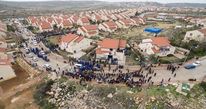
Israeli police confiscated Tuesday morning a Palestinian-owned store in Wadi al-Hilweh neighborhood in occupied Jerusalem’s town of Silwan under the pretext of public utility.
Israeli police forces stormed the neighborhood in the early morning hours accompanied with municipal crews and violently broke into a local store owned by Abdul Mohammed Abu Hadwan.
According to the PIC field reporter, Israeli forces started demolishing toilets in the confiscated store.
Family sources affirmed that the store was built 40 years ago, however; Israeli officials prevented them from using it anymore.
Israeli police prevented local residents from approaching the area, the sources added.
Meanwhile, Israeli bulldozers demolished a shed owned by the local resident Umar al-Qaq from Silwan town.
Israeli police forces stormed the neighborhood in the early morning hours accompanied with municipal crews and violently broke into a local store owned by Abdul Mohammed Abu Hadwan.
According to the PIC field reporter, Israeli forces started demolishing toilets in the confiscated store.
Family sources affirmed that the store was built 40 years ago, however; Israeli officials prevented them from using it anymore.
Israeli police prevented local residents from approaching the area, the sources added.
Meanwhile, Israeli bulldozers demolished a shed owned by the local resident Umar al-Qaq from Silwan town.

Gaza's main hospitals have run out of much-needed drugs and kit for surgeries and are about to suspend all urgent surgeries due to an Israeli blockade of its borders.
In a Monday statement, the Gaza-based Palestinian Ministry’s spokesman Ashraf al-Qidrah warned that surgeries and emergency services at Gaza’s hospitals are to be suspended in the next few days as a result of the acute dearth in medicines, medical items, and lab materials.
A few days ago, cleaning companies operating at Gaza hospitals announced a strike due to a salary-cut for the fourth month running. The strike was ended after the Health Minister pledged to shell out their salaries.
Israel has severely restricted the flow of cargo and people through Gaza's crossings, declaring Gaza a hostile entity and a blockaded area for over a decade’s time.
In the absence of drugs, anesthetics, and urgent medical referrals (blocked by the Palestinian Authority, chaired by Mahmoud Abbas and the Israeli occupation authorities), patients in the Gaza enclave have to wait for months, and even years, to undergo life-saving surgeries. Dozens have died halfway through.
In a Monday statement, the Gaza-based Palestinian Ministry’s spokesman Ashraf al-Qidrah warned that surgeries and emergency services at Gaza’s hospitals are to be suspended in the next few days as a result of the acute dearth in medicines, medical items, and lab materials.
A few days ago, cleaning companies operating at Gaza hospitals announced a strike due to a salary-cut for the fourth month running. The strike was ended after the Health Minister pledged to shell out their salaries.
Israel has severely restricted the flow of cargo and people through Gaza's crossings, declaring Gaza a hostile entity and a blockaded area for over a decade’s time.
In the absence of drugs, anesthetics, and urgent medical referrals (blocked by the Palestinian Authority, chaired by Mahmoud Abbas and the Israeli occupation authorities), patients in the Gaza enclave have to wait for months, and even years, to undergo life-saving surgeries. Dozens have died halfway through.
Page: 2 - 1
